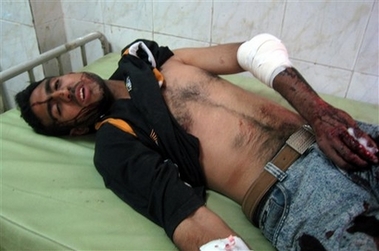Four blasts in Baghdad kill at least 183
(AP)Updated: 2007-04-19 05:52
Wednesday's car bombing appeared meticulously planned. It took place at a pedestrian entrance where tall concrete barriers had been erected after the earlier attack. It was the only way out of the compound, and the construction workers were widely known to leave at about 4 p.m. - the time of the bombing.
One builder, 28-year-old Salih Mustafa, said he was waiting for a bus home when the bomb exploded.
"I rushed with others to give a hand and help the victims," he said. "I saw three bodies in a wooden cart, and civilian cars were helping to take away the victims. It was really a horrible scene."
US military spokesman Maj. Gen. William Caldwell told The Associated Press that al-Qaida in Iraq was suspected in the bombing. "Initial indications based on intelligence sources show that it was linked to al-Qaida," Caldwell said in a late-night telephone interview.
Echoing those remarks, US Defense Secretary Robert Gates called the bombings "horrifying" and accused al-Qaida of being behind them.
The attacks appeared to be yet another attempt by Sunni insurgents and al-Qaida to force Shiite militiamen back onto the streets. Radical Shiite cleric Muqtada al-Sadr had ordered his Mahdi Army fighters to put away their weapons and go underground before the security crackdown began, leaving regions like those bombed on Wednesday highly vulnerable.
An outburst of violence from the Shiite militia would also ease pressure on the Sunni insurgents, creating a second front for US and Iraqi soldiers struggling to diminish violence in the capital and provide time for the Iraqi government to gather momentum for sectarian reconciliation.
US officials have reported a decrease in sectarian killings in Baghdad since the US-Iraqi security crackdown was launched Feb. 14. But the past week has seen several spectacular attacks in the capital, including a suicide bombing inside parliament and a powerful blast that collapsed a landmark bridge across the Tigris River. The number of bodies dumped in the streets of Baghdad also has risen significantly.
Brig. Gen. Qassim al-Moussawi, the Iraqi military spokesman, said, "We have not seen such a wave of attacks since the security plan began. These are terrorist challenges. Ninety-five percent of those killed today were civilians."
Late Wednesday, Prime Minister Nouri al-Maliki ordered the arrest of the Iraqi army colonel who was in charge of security in the region around the Sadriyah market. The colonel's name was not given.
"Our Iraqi people are being subjected to a brutal attack that does not differentiate between an old man, a child or a woman. This targeting of civilian populations brings back to our minds the mass crimes and genocide committed by the Saddamist dictatorial regime," said a statement from al-Maliki's office.
The 127 deaths in the market bombing were recorded by Raad Muhsin, an official at al-Kindi Hospital morgue where the victims were taken. A police official confirmed the toll, speaking on condition of anonymity because he was not authorized to release the information.
| 1 | 2 |  |
|
||
|
||
|
|


